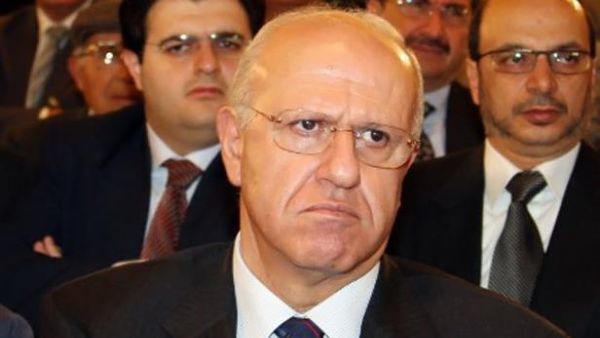The Military Court Wednesday sentenced former information minister Michel Samaha, who was being tried on terror charges, to four and a half years in prison a judicial source told The Daily Star.
Samaha, who has been under arrest since 2012, will be set for release by Nov. 27, since he has already served the majority of his sentence — the judicial year lasting only nine months.
He was sentenced after being found guilty of forming an armed gang, smuggling exposives from Syria into Lebanon and attempting to assassinate political and religious figures.
The court also revoked Samaha's civilian rights, the source added.
During Wednesday’s hearing Samaha said that he had informed the head of the Syrian National Security Bureau, Maj. Gen. Ali Mamlouk, and the director of his office, Lt. Col. Adnan of a plot orchestrated by Internal Security Forces informant Milad Kfoury to smuggle explosives into Lebanon.
“Mamlouk and Adnan don’t know Milad Kfoury,” Samaha said. “I was the one who told them that I have someone who wants to carry out explosions in Lebanon and I asked for their help.”
A former minister who maintained close ties with Syrian President Bashar Assad, the 66-year-old Samaha was arrested in 2012 and indicted the following year for smuggling explosives into Lebanon to target iftar banquets and gatherings in the northern district of Akkar, with the aim of killing politicians and religious figures. Brig. Gen. Khalil Ibrahim was presiding over his military tribunal.
The head of the Syrian National Security Bureau, Maj. Gen. Ali Mamlouk, and the director of his office, Lt. Col. Adnan, were also indicted for their part in the conspiracy. Ibrahim set Mamlouk’s trial for Oct. 16, after it was decided that further attempts would be made to serve him with an indictment. Previous efforts to indict Mamlouk were unsuccessful due to him residing in Syria and away from Lebanese authorities.
The court Wednesday also heard the testimony of Samaha's driver and body guard, Fares Mubarak, who said that Kfoury, the ISF informant who revealed the plot to Lebanese authorities, would visit Samaha’s residence on a weekly basis.
The witness, who accompanied Samaha on his trip from Damascus to Beirut, during which the explosives were smuggled into Lebanon, denied having any knowledge of the plot.
He also confessed to handing Kfoury a black bag which contained $170,000 which would be spent on the terrorist operations, though he claimed that he had no knowledge of the bags contents at the time.
Prosecutor Hani Hajjar dismissed Samaha’s claims that he was a victim of an intelligence trap set up by Kfoury, saying that the ISF is an official security agency that does not manipulate or entrap people.
“If there was a real trap then it is the trap that Samaha planted for the nation,” Hajjar added.
Meanwhile, Samaha’s defense council, Sakhr Hashem, argued that the suspect did not have the criminal intent to carry out terrorist plots in Lebanon.
He also claimed that Samaha was merely “a delivery boy” whose mission was to transport explosives from Mamlouk’s office and handing them over to Kfoury.
Last month, Samaha confessed that he had transported explosives into Lebanon with the aim of targeting Lebanese politicians and religious figures, claiming that he was lured to do so by a police intelligence agent.
In a startling confession which shocked relatives, journalists and defense attorneys attending the military tribunal, Samaha detailed a plot which, if successfully implemented, could have pushed Lebanon into a cycle of sectarian violence.
Samaha appeared confused at times, faltering and contradicting himself, but claimed he was being watched by domestic and foreign intelligence services who convinced him to carry out the act, “satisfying my ambitions,” and that they used people close to him to persuade him to cooperate.
By Youssef Diab








